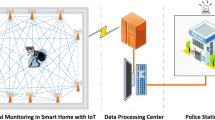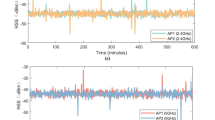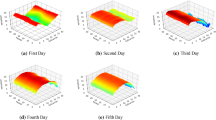Abstract
As an emerging technology, device-free localization (DFL) has a wide range of application scenarios in the field of the internet of things. However, most of the existing DFL methods take the mode of learning features from raw data, and then perform to achieve localization using classification, which has inferior localization performance. To improve the localization accuracy, this study proposes an accurate and effective localization technique based on deep dictionary learning with sparse representation (DDL-DFL). The method extracts the in-depth features of the data through multi-layer dictionary learning and stacks the features of each layer for classification. Furthermore, we propose a data augmentation method, which can be applied to scenarios with fewer sensor nodes to increase the data dimension and strengthen the essential features to improve the accuracy of localization. We evaluate the performance of the DDL-DFL algorithm on collected laboratory datasets, and the results are superior to existing localization algorithms. In addition, the DDL-DFL algorithm with data augmentation is conducted on the laboratory datasets with a low dimension of data, and the localization performance has been significantly improved.
Access this chapter
Tax calculation will be finalised at checkout
Purchases are for personal use only
Similar content being viewed by others
References
Yucel, F., Bulut, E.: Clustered crowd GPS for privacy valuing active localization. IEEE Access 6, 23213–23221 (2018)
Medina, C., Segura, J.C., De la Torre, A.J.S.: Ultrasound indoor positioning system based on a low-power wireless sensor network providing sub-centimeter accuracy. Sensors 13, 3501–3526 (2013)
Pahlavan, K., Krishnamurthy, P., Geng, Y.: Localization challenges for the emergence of the smart world. IEEE Access 3, 3058–3067 (2015)
Chang, L., et al.: FitLoc: fine-grained and low-cost device-free localization for multiple targets over various areas. IEEE/ACM Trans. Netw. 25, 1994–2007 (2017)
Guo, Y., Huang, K., Jiang, N., Guo, X., Li, Y., Wang, G.: An exponential-Rayleigh model for RSS-based device-free localization and tracking. IEEE Trans. Mob. Comput. 14, 484–494 (2014)
Huang, H., Zhao, H., Li, X., Ding, S., Zhao, L., Li, Z.: An accurate and efficient device-free localization approach based on sparse coding in subspace. IEEE Access 6, 61782–61799 (2018)
Kaltiokallio, O., Yiğitler, H., Jäntti, R.: A three-state received signal strength model for device-free localization. IEEE Trans. Veh. Technol. 66, 9226–9240 (2017)
Youssef, M., Mah, M., Agrawala, A.: Challenges: device-free passive localization for wireless environments. In: Proceedings of the 13th Annual ACM International Conference on Mobile Computing and Networking, pp. 222–229 (2007)
Wilson, J., Patwari, N.: Radio tomographic imaging with wireless networks. IEEE Trans. Mob. Comput. 9, 621–632 (2010)
Zhang, D., Liu, Y., Guo, X., Ni, L.M., Systems, D.: RASS: a real-time, accurate, and scalable system for tracking transceiver-free objects. IEEE Trans. Parallel Distrib. Syst. 24, 996–1008 (2012)
Wu, K., et al.: CSI-based indoor localization. IEEE Trans. Parallel Distrib. Syst. 24, 1300–1309 (2012)
Wang, X., Gao, L., Mao, S., Pandey, S.: CSI-based fingerprinting for indoor localization: a deep learning approach. IEEE Trans. Veh. Technol. 66, 763–776 (2016)
Zhao, L., Huang, H., Li, X., Ding, S., Zhao, H., Han, Z.: An accurate and robust approach of device-free localization with convolutional autoencoder. IEEE Internet Things J. 6, 5825–5840 (2019)
Huang, H., Han, Z., Ding, S., Su, C., Zhao, L.: Improved sparse coding algorithm with device-free localization technique for intrusion detection and monitoring. Symmetry 11, 637 (2019)
Li, X., Ding, S., Li, Z., Tan, B.: Device-free localization via dictionary learning with difference of convex programming. IEEE Sens. J. 17, 5599–5608 (2017)
Zhang, K., Tan, B., Ding, S., Li, Y.: Device-free indoor localization based on sparse coding with nonconvex regularization and adaptive relaxation localization criteria. Int. J. Mach. Learn. Cybern., 1–15 (2022). https://doi.org/10.1007/s13042-022-01559-x
Zhang, K., Tan, D., Ding, S.: Device-free indoor localization based on supervised dictionary learning. In: 2021 IEEE 7th International Conference on Cloud Computing and Intelligent Systems (CCIS), pp. 438–443. IEEE (2021)
Wang, J., Gao, Q., Wang, H., Cheng, P., Xin, K.: Device-free localization with multidimensional wireless link information. IEEE Trans. Veh. Technol. 64, 356–366 (2014)
Wright, J., Yang, A.Y., Ganesh, A., Sastry, S.S., Ma, Y.: Robust face recognition via sparse representation. IEEE Trans. Pattern Anal. Mach. Intell. 31, 210–227 (2008)
Tariyal, S., Majumdar, A., Singh, R., Vatsa, M.: Deep dictionary learning. IEEE Access 4, 10096–10109 (2016)
Candes, E.J., Tao, T.: Near-optimal signal recovery from random projections: universal encoding strategies. IEEE Trans. Inf. Theory 52, 5406–5425 (2006)
Donoho, D.L., Elad, M.: Optimally sparse representation in general (nonorthogonal) dictionaries via ℓ1 minimization. Proc. Nat. Acad. Sci. USA 100, 2197–2202 (2003)
Wang, J., Feng, X., Gao, Q., Zhang, X., Jin, M.: FM-based device-free localization and activity recognition via sparse representation. In: Proceedings of the 1st Workshop on Context Sensing and Activity Recognition, pp. 7–12 (2015)
Liu, T., Luo, X., Liang, Z., Networks, A.: Enhanced sparse representation-based device-free localization with radio tomography networks. J. Sens. Actuator Netw. 7, 7 (2018)
Acknowledgements
This research was partially funded by the Guangxi Postdoctoral Special Foundation and the National Natural Science Foundation of China under Grants 61903090 and 62076077, respectively.
Author information
Authors and Affiliations
Corresponding author
Editor information
Editors and Affiliations
Rights and permissions
Copyright information
© 2022 The Author(s), under exclusive license to Springer Nature Switzerland AG
About this paper
Cite this paper
Wang, M., Tan, B., Ding, S., Li, Y. (2022). A Novel Device-Free Localization Approach Based on Deep Dictionary Learning. In: Fang, L., Povey, D., Zhai, G., Mei, T., Wang, R. (eds) Artificial Intelligence. CICAI 2022. Lecture Notes in Computer Science(), vol 13605. Springer, Cham. https://doi.org/10.1007/978-3-031-20500-2_31
Download citation
DOI: https://doi.org/10.1007/978-3-031-20500-2_31
Published:
Publisher Name: Springer, Cham
Print ISBN: 978-3-031-20499-9
Online ISBN: 978-3-031-20500-2
eBook Packages: Computer ScienceComputer Science (R0)




